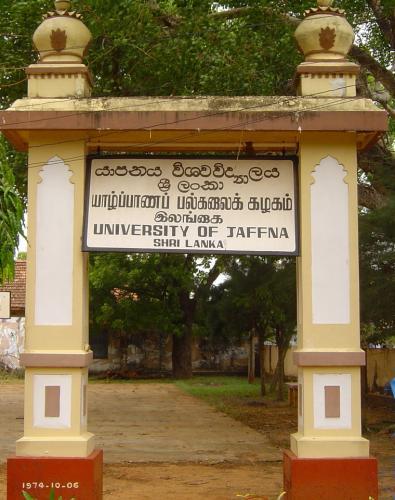By Emma Holdsworth, BA International Relations and Japanese
Protests involving dozens of Tamil civilians, students, and politicians broke out in Sri Lanka following the news of a Tamil war memorial being destroyed by a bulldozer on Jaffna University Campus at 8:45pm on 8 January. The Tamil Guardian reports how protestors sat peacefully, waiting for explanations, chanting: ‘we need to speak, we need to speak with the Vice Chancellor’ and ‘Don’t commit race betrayal.’
As a result, government authorities deployed a Special Police Task Force to block the campus entrance, ordering protestors to go home. Vice Chancellor, S. Srisatkunarajah, himself a Tamil Sri Lankan, expressed the necessity for the protest to be dispersed: ‘if they do not go by themselves, we will deal with them.’ The Tamil Guardian reported that by the evening, two students had been arrested.
The protests continued over the weekend into a hunger strike, as protestors erected tents in front of the campus. BBC News reports the arrival of a doctor on site, as a student’s health deteriorated with the continuation of the hunger strike.
The memorial itself had been unveiled in 2019 by students to mark the 10 year anniversary of the Mullivaikkal massacre. The 2009 massacre resulted in the death of 40,000 Tamil civilians at the hands of Government forces. The government and the University’s Vice Chancellor claimed that the memorial had been illegally erected, and hence must be destroyed. The University Grants Commission also deemed the monument a threat to national unity, while Public Security Minister, Sarath Weerasekera, declared that ‘no one will and should be allowed to commemorate dead terrorists.’
‘This act is an insult not only to the university students but also to the entire Tamil people.’
In a statement to the Tamil Guardian, the University’s Student Union accused the government of an anti Tamil-decision: ‘This act is an insult not only to the university students but also to the entire Tamil people. It is also an act of denial of a people’s right to memory.’ The Indian province of Tamil Nadu condemned the Sri Lankan government’s actions, while Tamils in Canada organised a car rally.
The Student Union also redacted an official letter appealing to international governments’ help: ‘We [are] afraid for our lives and we cordially request your help to prevent this situation.’ This triggered support from Germany and the United Kingdom, as Oxford University officially supported the protests. Similarly, the British MP Siobhain McDonagh declared on Twitter that the UK government must ‘take a leading role at the UN Human Rights Council in March’ for ‘the promotion and protection of human rights in Sri Lanka.’
On Monday the 11th, the Sri Lankan Government promised to rebuild a legal memorial at the same place. Following this, the University Vice Chancellor met up with student protestors in the morning to set the first stone, as shown by a BBC News video. Although this halted hostilities, university student Dwakaran told BBC News: ‘if the memorial is not built again we will resume our protest.’
Photo caption: University of Jaffna (Credit: BlueLankan at English Wikipedia).
